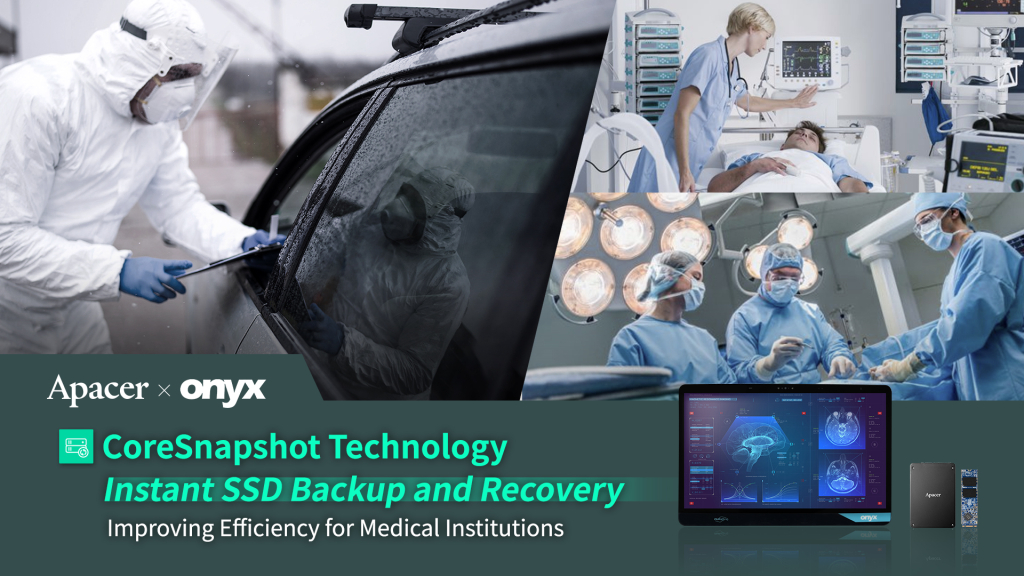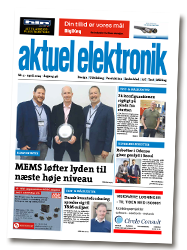Apacer and Onyx Collaborate on Medical Devices with One-second Data and OS Restoration CoreSnapshot Expands its Applications, Improving Efficiency for Medical Institutions
As the COVID-19 pandemic accelerates the development of telemedicine and AI for healthcare applications, Apacer, a world leader in industrial storage and memory, has teamed up with Onyx Healthcare to integrate Apacer’s CoreSnapshot one-second OS and data recovery technology into medical-grade devices. The results of this collaboration are products that cut costs associated with manual repairs while helping keep hospitals running according to schedule. In the new normal after the pandemic, devices like this will be in great demand worldwide.
 The integrity and immediacy of the data stored in medical devices is closely related to the diagnosis, monitoring and treatment of a disease. Sudden downtime caused by a blue screen of death (BSoD) may bring risks to medical institutions, such as interruption of medical services. These can negatively affect diagnosis efficiency, delaying the timing of diagnosis and treatment, and in some cases leading to unnecessary medical disputes. Dean Lin, product manager of Onyx’s Intelligent Clinics Dept., speaking on behalf of Onyx, pointed out that medical care services often find themselves in a race against time. Medical devices equipped with CoreSnapshot technology are like an emergency room for data, which can greatly reduce the waiting time for troubleshooting. The risk of incorrect diagnosis or disruption of medical procedures is greatly minimized.
The integrity and immediacy of the data stored in medical devices is closely related to the diagnosis, monitoring and treatment of a disease. Sudden downtime caused by a blue screen of death (BSoD) may bring risks to medical institutions, such as interruption of medical services. These can negatively affect diagnosis efficiency, delaying the timing of diagnosis and treatment, and in some cases leading to unnecessary medical disputes. Dean Lin, product manager of Onyx’s Intelligent Clinics Dept., speaking on behalf of Onyx, pointed out that medical care services often find themselves in a race against time. Medical devices equipped with CoreSnapshot technology are like an emergency room for data, which can greatly reduce the waiting time for troubleshooting. The risk of incorrect diagnosis or disruption of medical procedures is greatly minimized.
Onyx’s medical devices are now protected by Apacer’s CoreSnapshot technology. If an OS crash occurs, the operator can press an embedded hardware button to immediately execute the SSD recovery mechanism. The data and OS will be restored to their backup state in less than one second, and the device will immediately returns to normal operation. Apacer has developed a client version of CoreSnapshot technology which is equipped with an AES-256 SSD hardware encryption algorithm to prevent patient data and medical records from being exposed to the threat of improper external access. In the future, it will be the first to be used in medical nursing carts in screening stations, medical PCs and tablets, as well as mobile medical tablets, assisting with medical imaging diagnosis, patient monitoring, and electronic medical record inquiries.
Jerry Hsu, project manager of Apacer’s Industrial Storage Application Dept., said that this collaboration brings together Onyx’s rich medical industry experience and Apacer’s R&D capabilities in storage technology. It’s a prime example of Apacer’s dedication to “Adding value, enhancing collaboration.” It will help both parties continue to provide value-added solutions for the application fields of telemedicine, mobile health and AI smart healthcare, and continue to drive innovation and industrial development.
Further information about Apacer CoreSnapshot SSDs and CoreSnapshot in medical device video.


